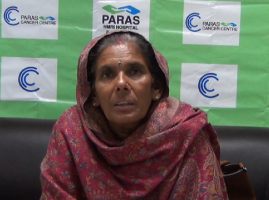Mar 2, 2024
Patient with Rare Blood Disorder Treated at Paras HMRI Hospital, Patna

The woman from East Champaran had low platelet count, the cause of which could not be diagnosed anywhere
Her condition was finally diagnosed at Paras HMRI, Patna as Thrombotic thrombocytopenic purpura, which can potentially fatal
Doctors at Paras HMRI Hospital, Patna have treated a woman with a very rare and potentially life-threatening form of blood coagulation disorder in which miniscule clots are formed across the body that can be fatal if not treated in time.
Anila Devi, 48, from East Champaran, was brought to the Emergency Department of Paras HMRI Hospital, Patna with high grade fever and blabbering for seven days. Initial evaluation and blood tests revealed she was Anemic and having low platelet counts. However, tests for dengue, malaria, typhoid, and other possible infectious diseases came out negative.

Given her deteriorating condition and inability of doctors back home to diagnose her disease, her family was highly concerned and worried.
Gauging the immediate need to detect the cause of her condition, a Hematology team headed by Dr. Avinash Kumar Singh was urgently brought on board. A series of investigations revealed it to be a case of Thrombotic thrombocytopenic purpura or TTP, a rare and complex blood disorder that can be fatal if not treated on time.
“TTP is a very rare disease. Hence, diagnosing it often becomes a problem. In this blood disorder, antibody is formed which results in the development of microscopic blood clots in small blood vessels throughout the body. This results in decrease in RBC Platelets, since platelets are the clotting material and are used up in the clotting process,” explains Dr. Avinash Kumar Singh, Consultant Hematologist at Paras HMRI, Patna.
Once the diagnosis was made, the patient was immediately started on Plasmapheresis and steroids. Plasmapheresis is a procedure to replace the patient’s plasma with normal plasma so that the antibody is removed from the body, paving the way for normalization of the patient.
“The condition needs to be treated as urgently as these miniature blood clots can result in damage to multiple organs including the kidney, heart and the brain by blocking the flow of oxygen-rich blood to these organs. So the condition of patient can deteriorate very rapidly, and can result in death. Also, with the platelet count falling, bleeding problems can also occur. It is essential to point out here that diagnosing and treating such rare and complex disorders need high degree of expertise and precision. In many cases, such a condition is not diagnosed on time and the patient suffer irreversible organ damage or death due to it,” adds Dr. Singh.
After six sessions of this procedure, Anila Devi’s platelet count, which was less than 20,000 at the time of admission, again rose to more than 1.5 lakh. Now, Anila Devi is perfectly fine and living a normal life. She is thankful to doctors at Paras HMRI Hospital for diagnosing her condition and treating it in due time to save her life.
